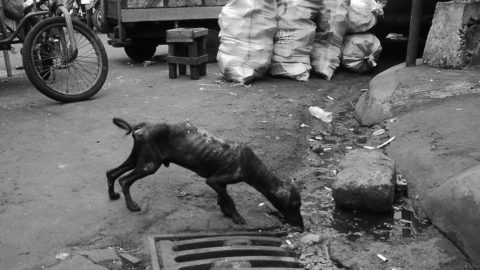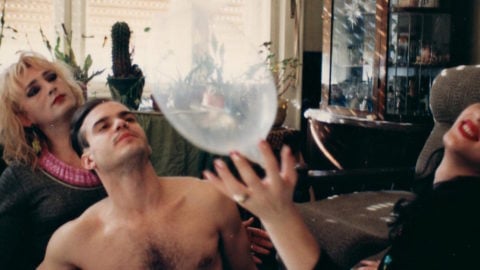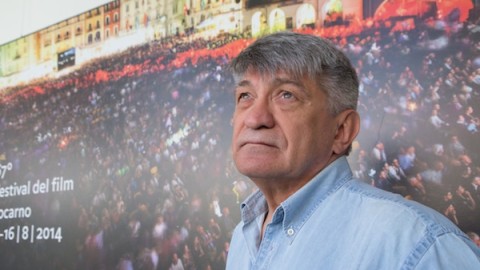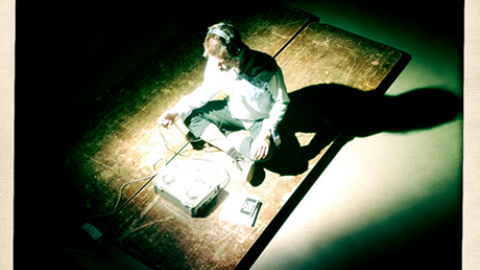Festivals: Oberhausen
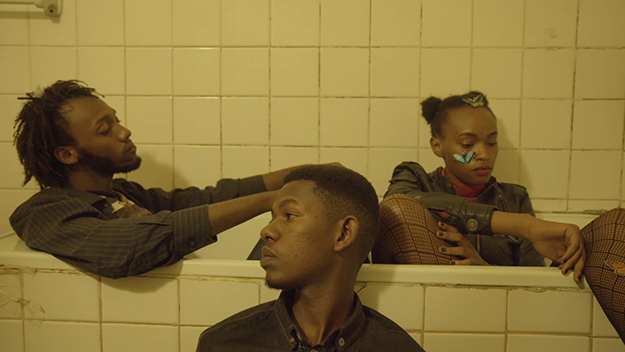
I Got My Things and Left (Philbert Aimé Mbabazi Sharangabo, 2018)
One of the world’s oldest film festivals, the Oberhausen Kurzfilmtage drew to a close last week, its 65th edition returning to its roots of radical cinema politics and contradicting them at the same time. Shorts aside, one star of this year’s edition was Aleksandr Sokurov, who gave a master class in addition to screening several of his films, including the very rarely shown Spiritual Voices (1995, a full 327 minutes in length). The critic Maya Turovskaya, in her book on Sokurov excerpted in the festival catalogue, writes of his films as anti-cinematic in how unceremoniously they present their heroes (such as Boris Yeltsin in Soviet Elegy, 1989), the eye finding “nothing that it can attach to” in their vague surroundings, and how, paradoxically, the key to finding a musical structure in his films is precisely their anti-cinematic attitude, their monotonous yet fascinating rhythm. Sokurov himself announced at a Q&A that cinema is not an art of its own and that he had never even wanted to become a filmmaker—how fitting for a festival, where some decades ago (with the Oberhausen Manifesto) a cinema was proclaimed dead!
The Grand Prize of the City of Oberhausen this year went to the Rwandan-Swiss short I Got My Things and Left, a film about a group of people remembering their deceased friend and his social and creative legacy. Inspired by the transgressive life of Zimbabwean novelist Dambudzo Marechera, I Got My Things and Left was recognized for “shifting elegantly between language registers from poetry to performance, from music to personal diary, from reality to its cinematic interpretation.” The Principal Prize went to Zombies by Baloji, a surreal, futuristic “music thriller” set in Kinshasa, for “addressing the emotional and social cost of social media, yet celebrating the city’s vibrant subculture.” Other prize winners in the International Competition were L’Étoile de mer (Maya Schweizer), IO (Art Union Marmelade), Elvis: Strung Out (Mark Oliver), Student Bodies (Ho Rui An), NoirBLUE – Deslocamentos de uma dança (Ana Pi), and ALGO-RHYTHM (Manu Luksch).
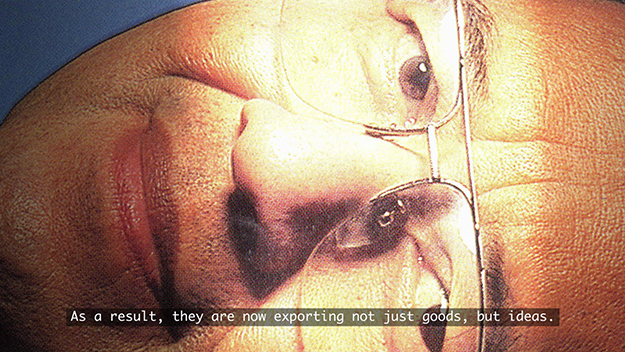
Student Bodies (Ho Rui An, 2019)
Showing in the Conditional section, Peter Miller returned this year with his exploration of the cinema space with the project/performance piece This Thing Connecting Us. Last year, this newly introduced section began to investigate film post-cinema, as it leaves its traditional venues for galleries and other non-theatrical spaces that allow audience movement. The section implicitly poses the question: is the cinema today an almost fantastical place, in its confines of darkness, silence, and immobility? Miller adds another wrinkle: what about film stock itself—is it still something finite, concrete, material, or can it now be improvised and fluid, translatable into different surroundings, and could it perhaps even be assembled at home like other domestic items? In This Thing Connecting Us, a celluloid film was screened that depicts an audience from the day before in the same cinema (Gloria in the Lichtburg Filmpalast) as a reel of film was unwound and laid out from the first to the last seat, connecting all the rows; the audience members on screen lift the film to the light to see what it depicts. Meanwhile, during this screening, another roll of film traveled through the cinema—a copy of the one being screened—such that the new viewing audience replicates what is taking place on screen. When is a film really, truly experienced—when we are watching it from some meters away on a film screen, or when we are holding it in the hands?
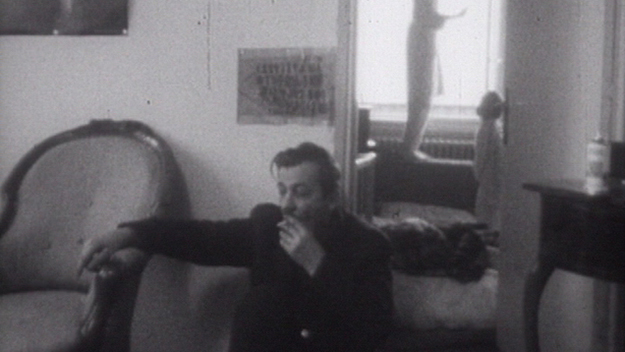
Black Film (Želimir Žilnik, 1971)
In his infamous Black Film (1971), screened at the festival in the 1970s, Želimir Žilnik was even more radical in his contemplation of cinema, by bluntly writing on the film copy: “Film—weapon or shit?” In a performance piece for the Re-Selected program, Žilnik read an excerpt from his manifesto “This Festival Is a Cemetery,” originally written for the film festival in Pančevo, Serbia, where he denounced “socially engaged films” and their search for “the most picturesque wretch that is prepared to convincingly suffer in front of the camera.” Black Film—a short documentary in which Žilnik finds six homeless men on the street of Novi Sad and brings them to the small flat where he lives with his wife and daughter—prompted him to accuse himself of hypocrisy as a filmmaker. Žilnik’s critique of an exploitative cinema, catering to the elites’ tastes, rings true at today’s Oberhausen as well: a festival that initially strived not only to promote short film, but also to make film and especially filmmaking more widely accessible, was once a living part of Oberhausen itself—a city with a strong mining industry, with the local population comprising an integral part of the audience—but today has changed into something different. Visited almost exclusively by curators, filmmakers, programmers, and other film professionals to keep up with the trends in short and experimental film, the Oberhausen International Short Film Festival is world-famous for its excellent programming but in some ways alienated from its own city.
In 1973, the short film Social Experiment by Dejan Đurković was screened with Black Film, a documentary about Belgrade students, who, out of solidarity, join miners on a hunger strike. The film copy of Social Experiment has not been preserved, but there was a German translation of the dialogue, discovered in the festival archive. The dialogue seemed to have been originally read live as the film was screened, with visual cues for reading added in handwriting. And so, following Žilnik’s piece, there was a performance piece of a non-existent film: the cues were projected on a black screen, and the dialogue between the students discussing the hunger strike was read by a group of Croatian film critics, programmers, and filmmakers, their accented German well-suited to a film formed in the minds of the audience. An additional reading was possible from the local context: some of the performers are involved with Kino Europa, the center of the film and cultural community in Croatia’s capital, Zagreb, slated to be shut down soon in what many intellectuals and artists view as part of the systematic destruction of the city’s cultural life by conservative authorities. If students in the ’70s joined miners on hunger strikes, such alliances are less possible in individualized and fragmented neoliberal societies; the (unintentional) message of this year’s festival in Oberhausen might have been that not only films but certain political praxes are disappearing, too.
Tina Poglajen is a freelance film critic. She likes going to film festivals.



